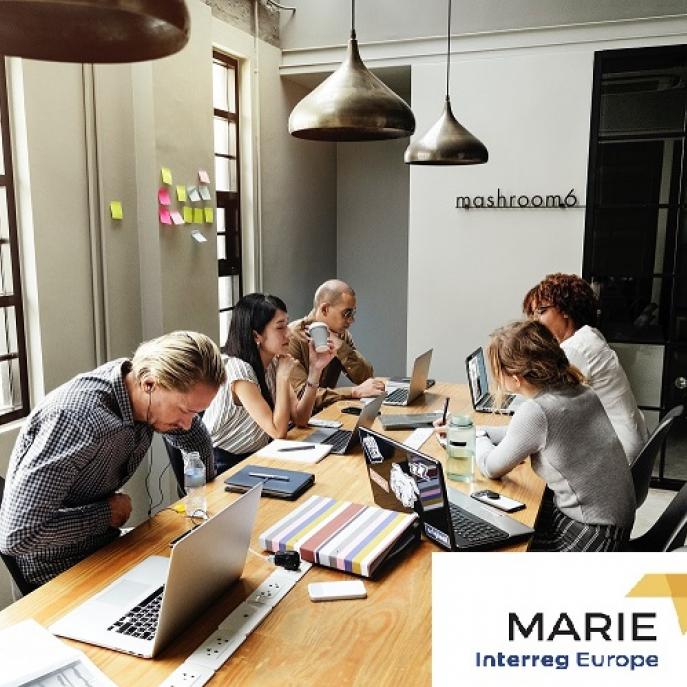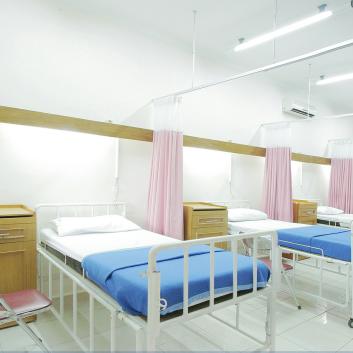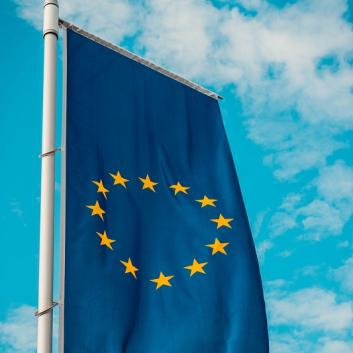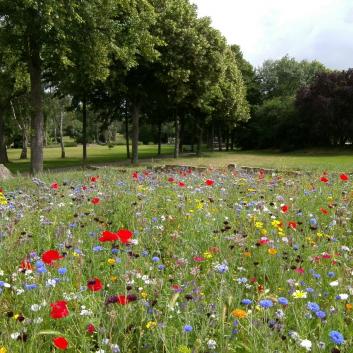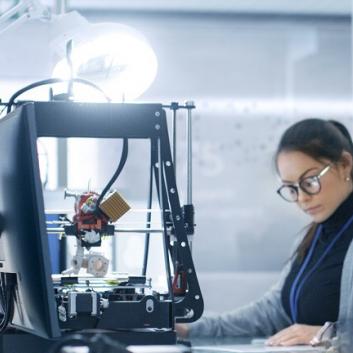Responsible Research and Innovation in action
EU regions are starting to address Responsible Research and Innovation (RRI), but they face common challenges of the perceived complexity of the concept and means of application.
Giulia Bubbolini from the Centre for Innovation and Economic Development and Jessica Huntingford, Head of European Projects at Resolvo are working shoulder to shoulder with 10 partners from 8 regions on the MARIE (Mainstreaming Responsible Innovation in European 3S) project to integrate Responsible Innovation into funding programmes.
Q: What is the easiest way to explain RRI - Responsible Research and Innovation?
“We can only find the right answers to the challenges we face by involving as many stakeholders as possible in the research and innovation process. Research and innovation must respond to the needs and ambitions of society, reflect its values, and be responsible.” The European Commission (Science in Dialogue Towards a European Model for Responsible Research and Innovation, 2012),
That sounds like an ambitious goal but we’d like to keep it simple and linking it to real life examples happening in our regions.
In practice, if you work towards RRI you know that innovation is essential for our enterprises to compete and survive on the global market and that it has the potential to change lives. However, you also know that there are too many examples of innovations that have reached the market only to reveal negative short or long-term impacts.
RRI is an attempt to anticipate these negative impacts and to redirect innovation towards a model that reflects on creating a positive impact from the start to the finish of the innovation chain.

Q: What are the key objectives of the MARIE project and how do you see progress so far?
A lot of work has been done at the academic level and even at the individual enterprise level and to set a framework in place at the European level. Less work has been done to ensure that local and regional authorities are designing and implementing policies that really encourage their beneficiaries and stakeholders to anticipate negative impacts of innovation and reflect on impact.
This is where MARIE project fits in.
We want to take RRI to the public policy sphere. We use interregional exchange to help public authorities to integrate responsibilities into major innovation funding programmes, including ERDF (European Regional Development Fund) Regional Operational Programmes and the Smart Specialisation Strategies that lie behind them.
Our objective is to ensure that regional public policy supports the delivery of RRI to enterprises’ product, process and service design, production and distribution.
After 2 and a half years we are already seeing concrete results.
We started with exchanging, understanding and analysing.
Now partners are using that foundation to design Action Plans that detail in concrete terms how their policies can incorporate RRI and promote it across their territories. Some are creating a community of stakeholders to raise awareness about RRI.
Others are considering how to integrate responsible criteria into ERDF calls for innovative SMEs or for other territorial actors. Partners are also looking at how the monitoring systems of their Research & Development (R&D) funded projects can better reflect a focus on impact. Action Plans will be finalised and approved by the end of this year.
Our partners are all stakeholders involved in local and regional development. They either manage directly or support main policy instruments in their territories, which is important to ensure that we can have a real impact on the policy framework.
We have 4 regional councils/ministries, 1 national funding agency and 3 local development and innovation agencies. Besides, 2 universities are supporting their regional authority in Action Plan development and our partners cover 8 European countries, and each has had something to offer in terms of experience.
We have been lucky because our partners are committed to the project and to the theme of RRI and are really working to achieve project results. We also put a good management structure in place, covering all our bases. Centre for Innovation and Economic Development is a lead partner with previous project management experience and extensive knowledge of RRI.

The Exchange Coordinator role was allocated to Athens University of Economic and Business – Research Centre ensuring that the methodological structure of the project was sound. Resolvo Srl, expert in Interreg Europe and specialised in responsible development, supports all stages of project design, implementation and monitoring.
Q: What is your biggest learning so far as a partner in the MARIE project?
One of our partners is the Southern Regional Assembly in Ireland, where RRI is a relatively new concept however through their involvement in the MARIE project they have been introduced to an RRI community they may not otherwise have been aware of.
“Engaging with our stakeholders has made us realise there is a huge appetite out there for working responsibly which is very encouraging.
Interreg Europe promotes small policy changes and the biggest learning we have taken as a partner is the far-reaching impact even a small change to public policy can have. “, said Karen Coughlan, EU projects officer at Southern Regional Assembly.
Q: What is the potential impact of this project?
Our objective is not to make wide-scale recommendations, not to influence European and national agendas. We are expecting impact largely at the regional level.
We aim to make real change to the funding programmes currently in place in the European regions involved in MARIE. We will be monitoring this change over the second phase of the project, which runs from January 2020 to December 2021.
So far, partners are expecting to increase awareness among regional stakeholders about RRI, its potential benefits and how to apply it. They are also expecting to grow the number of applications for regional R&D funding that incorporate RRI analysis, measures and monitoring.
"We hope that the long-term impact of these concrete changes will be visible in terms of more economic development: competitive SMEs, who innovate responsibly," says Giulia Bubbolini lead partner of the MARIE project.
Q: What have been the most inspirational part of the MARIE project so far for you?
As Lead Partner, we have an overview of what all partners are doing and of the whole evolution of the project. The most inspirational part so far was seeing all the learning and exchange suddenly kick in, when a couple of regions came forward with real proposals to make an immediate change to their policy instruments.
They showed all of us that interregional cooperation can lead to action, if we are proactive and grab the opportunity to make a change. We look forward to seeing the same happen to the other partners – they are all working hard in that direction.
“Knowing we have a voice in how to influence regional policy for innovation has been hugely inspirational. RRI is a not that well known in Ireland so working as a partner on the project with other regions with the same goals has been of immense value.
We all want the world to be a better place and RRI plays a huge role in achieving this. Through our involvement in the MARIE project, we get to set the framework for a better future.” adding Karen Coughlan representing the Southern Regional Assembly in Ireland.
Q: Can you share some of the best case studies that you came across in the MARIE project?
We are already seeing concrete results with our project. Here are two examples:
Finland
In Tampere region, the regional council has integrated Responsible Innovation (RI) criteria into the evaluation of proposals within an ERDF call on Artificial Intelligence. All proposals were asked to demonstrate the value of their proposal in terms of 6 RI criteria: engagement, ethics, openness and transparency, safety and reliability. Proposals are under evaluation and it is expected that 5 will be approved, mobilising around 1.7M€: 5 projects that are more responsible, thanks to this change.
Southern and Eastern Region of Ireland
In Southern Ireland, the regional assembly has integrated the monitoring system for ERDF research funding with principles related to public engagement and science education, encouraging researchers to consider further the social impact of their work. This monitoring covers two funding schemes, which between them have co-funded set up of 14 research centres and made 17 awards to existing research centres. All of these will integrate responsible principles to their monitoring.
Q: Is there any advice that you would share with someone who is interested to work on RRI related projects?
As Lead Partner, we have attempted to fit MARIE into a network of European projects working on RRI. There are so many projects out there at the moment, so it makes sense to work with others and build on what they are doing.
We would suggest that anyone interested in RRI should first see what has already been done and then get in contact with the people that did it. You can learn so much, save time and get better results
"The best is to come in with an open mind! Collaboration and learning are key to the success of any project so don’t be afraid to reach out to someone already working on a project in this area.
There is a huge RRI community and there will be no obstacle or problem that hasn’t been encountered and overcome.
RRI can sometimes be perceived as stick however it can also prove to be a very effective carrot when used in the right way!

Responsibility and success can go hand in hand." says Karen Coughlan
Over the next few months, you can expect to find there more examples of policy improvements going on across our partner regions.
We would be glad to welcome stakeholders who are interested to find out more to join us at our upcoming events. You can find details on the MARIE project website!






